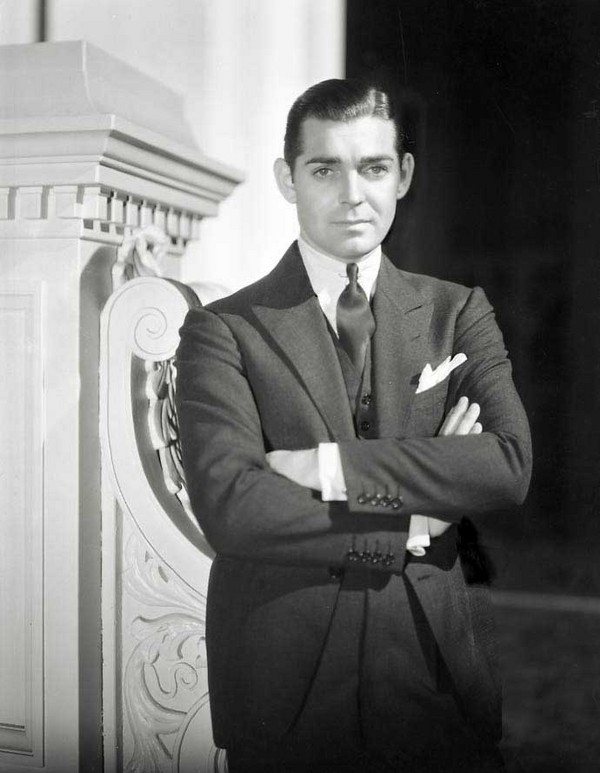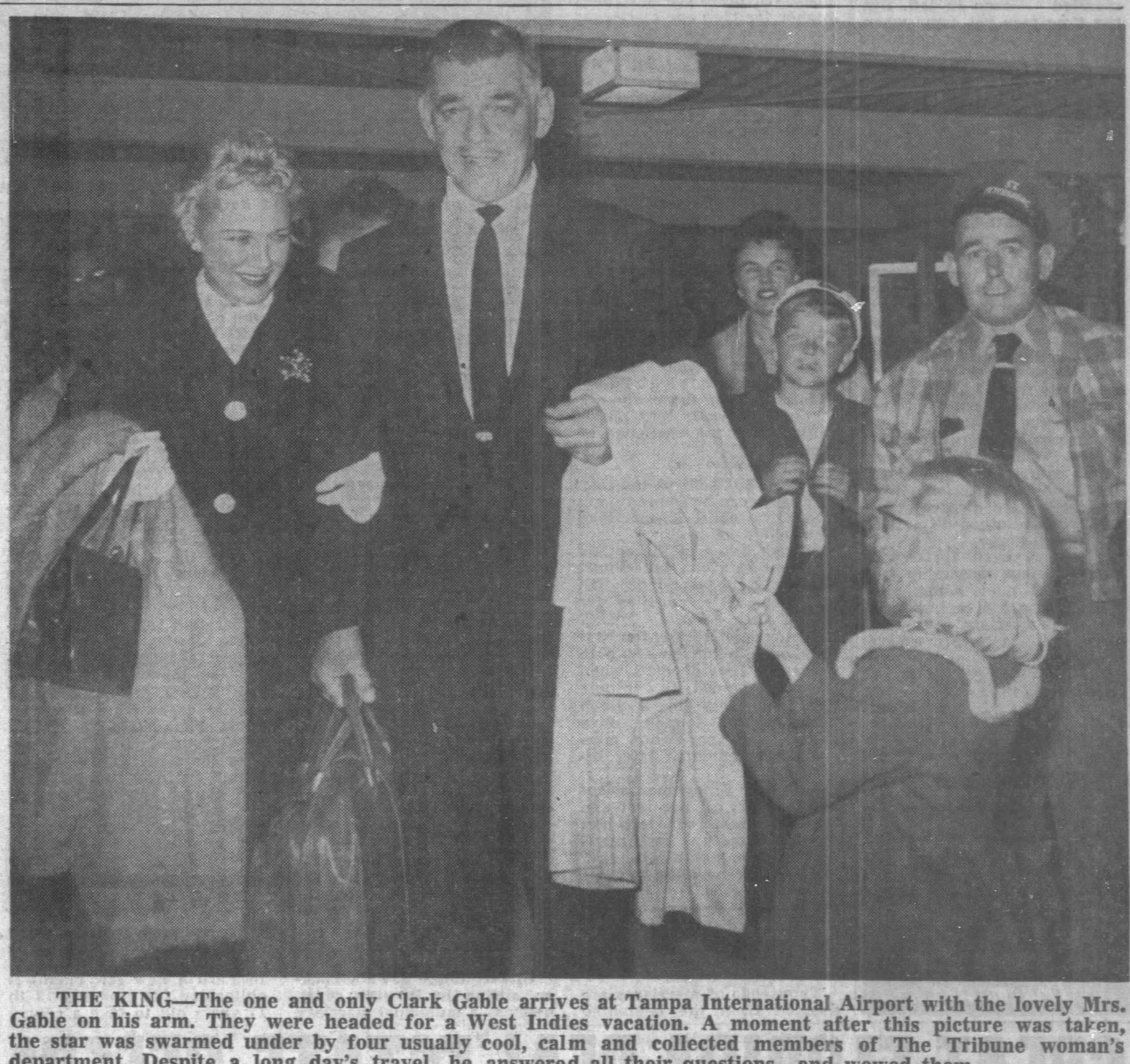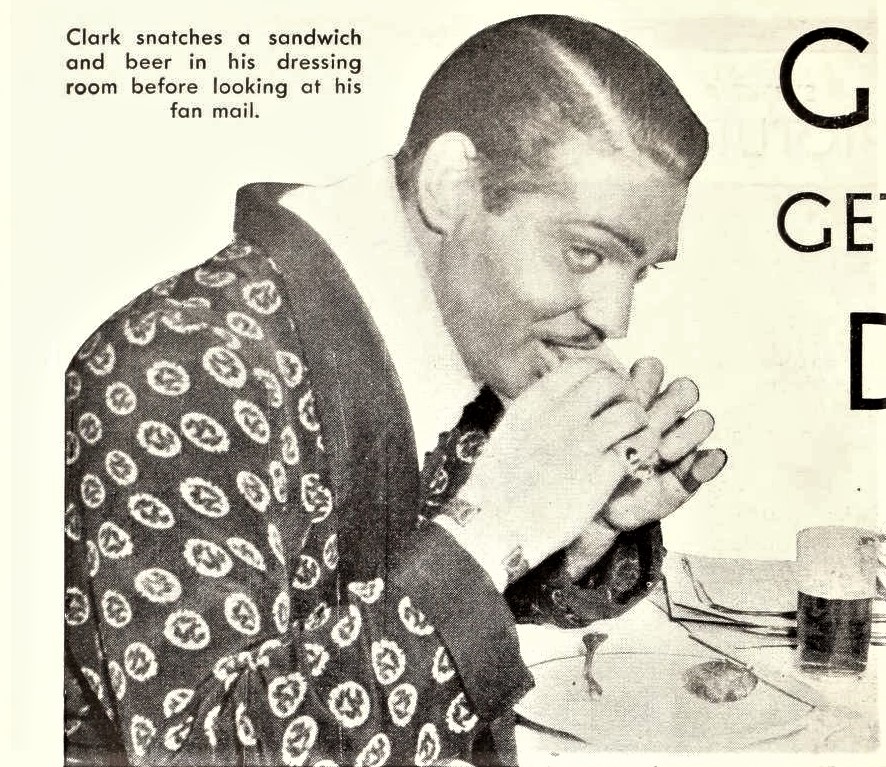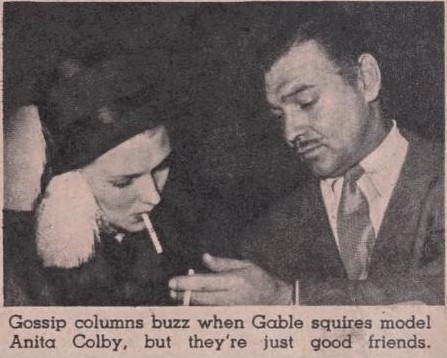{New Article} 1932: The Great God Gable
I have had this article for a year; it has been sitting at the top of my “to type” pile. Every time I go to type it, I pass it up for another one because it is just too dang long and not even terribly interesting. In the magazine, it’s 11 pages. Typed and printed, it’s 13 pages and 6,055 words! And I wonder why I am beginning to get carpal tunnel.
What also turned me off about it is that it is written by Adela Rogers St. Johns. What, you gasp, how can you not like Adela Rogers St. Johns?! She was an acclaimed female journalist, she wrote A Free Soul—the book that the film that made Clark Gable a star was based on, she was awarded The Presidential Medal of Freedom! All true and she seems a fine woman. Clark and Adela were actually close friends for decades. In fact, there were stupid rumors that they were lovers and that he fathered one of her sons. She always dismissed those rumors, saying, “What woman would deny that Clark Gable was the father of her child?” Ok, so, the answer to that question is Loretta Young but I digress. No, the reason I don’t like her articles is her writing style; it is the fanciful, curly-q type of writing that suits itself to romance novels, not reporting—at least early on. I have several articles written by her in the Article Archive and indeed her writing style changed with the times. Post World War II, she was much more straightforward. The fanciful writing of the 1920’s and early 1930’s would not fly with post-war America. Compare the mind-numbing sugary At Last! Mrs. Clark Gable Talks! from 1938 to A Personal Story on Clark Gable from 1944. It’s good that she changed with times, but for this article, written in 1932, we are stuck with:
Youth clings to him, youth that demands excitement and undiluted adventure. The smell of the soil clings to him, the desire for down-to-earth, hearty living and eating and drinking and loving. There are no complexes, no inhibitions. No fixations, no phobias about Clark. His greed for life, for pleasure, for battle, for conquest, for money, is normal and honest and it vibrates in a room and wipes out the pale lavender scent of pseudo-sophistication,
How he would have loved the roistering, swashbuckling, dangerous days of d’Artagnan, the savage pioneer days of Daniel Boone, the hard-riding, hard-drinking, seafaring epoch of England’s Virgin Queen! And how Elizabeth would have loved him! Perhaps she wouldn’t have remained a virgin queen long if Gable had spread his cloak for her to walk upon. Gable isn’t the kind of man to spread cloaks for nothing.
Instead of all that, he must find his thrills before the camera and spread his cloak for cinema queens. But he loves it. He gloats in his success as a gambler gloats when he catches the fourth ace in a ten-thousand-dollar pot. After the lean years, the hard years, luck broke and poured the fleshpots of the world into his lap. And he makes no bones about thinking it’s a great idea.
After years of the usual affections, introspections, fears, and careful propaganda of most actors, the honesty, the naturalness, the frank pleasure and open delight of Clark Gable are like a breath of pine forest after the sick breath of a speakeasy.
She actually says that the Virgin Queen Elizabeth probably wouldn’t be a virgin if she met Clark. Oh my goodness. Let’s just move on from this frosting…
Quite interesting is Adela’s mention of the current Mrs. Gable, Ria Langham. It’s quite notable that she is hardly a mention until far into the article, after the lust he stirs up for all womanhood.
Gable never suggests a married man, yet he has been married twice.
The present Mrs. Gable has been more less a mystery to Hollywood. She gives no interviews, receives few callers, and never discusses Clark Gable.
I met her by chance at abridge luncheon given by Lionel Barrymore’s fascinating and exquisite wife, the former Irene Fenwick. To my surprise, I found that a tall, majestic lady in severe and black satin was Mrs. Clark Gable. A dark woman, she suggests a regal and aristocratic beauty that belonged to Florence Vidor.
A determined, set, rather hard mouth she has, but her eyes are dark and sad and a little wistful.
I rather expected her to say something about A Free Soul, which happened to be my story and which gave Clark his first real part, as the gambler.
But she didn’t. Her graciousness seems to freeze at the thought of being interviewed or studied as the wife of the man so many women admire.
During the bridge game one of the many players at her table, a charming little woman in no way connected with pictures, said:
“I daresay you’re very tire of hearing compliments about your husband, Mrs. Gable. But I do feel I’d like to tell you what a refreshing thing it is to have him in pictures. His work is so natural and splendid.”
Mrs. Gable looked at her and did not reply.
There is a world of character in her face. She suggests Park Avenue, the well groomed woman of the world. She suggests the woman who has always had money, always worn smart clothes. She has a daughter eighteen and a son twelve, by a former marriage, and she is a devoted mother.
But the world of pictures, of the theater, is new to her. When she married Clark Gable in Santa Ana, not many months ago, she stepped into a land and a people as strange to her as China.
Her job is a tough one. But she has a determination, a will, that should see her through.
She had been losing heavily at bridge. Her partner, a girl famous as one of the greatest horsewomen in the country, said, “We’re certainly having a bad run of cards.”
Mrs. Gable sat up, looking like a Roman empress, and said, “It’s got to stop. If there’s one thing I have, it’s a determination to go through with anything I start.” Her playing improved. She made a couple of daring bids and got away with them. With a brilliant smile, she said, “You see. Bulldog determination always wins in the long run.”
I find that perfectly funny and I can imagine it being a direct quote. Ria was obviously a stubborn woman; she set her sights on Clark, trapped him, and when he tried to wiggle free, she played every card she had to keep him. I have always wondered what these female fans of Clark Gable thought of his wife back then, early in his career. Here was their new heartthrob, this burly he-man who knocked women around and swept them off his feet. And his wife was an older, matronly, Park Avenue-type with teenage kids? Adela was well-aware, as was everyone in Hollywood at this time, that Joan Crawford was spending more time with Clark than his wife was those days. Which might explain Ria’s lack of desire to discuss her husband at length.
Adela goes on to tell the tired stories of how Clark met Josephine Dillon, his affair with Pauline Frederick, how he learned to ride a horse just to play in The Painted Desert, and more. You can read the entire article (all 13 pages!) in The Article Archive.



